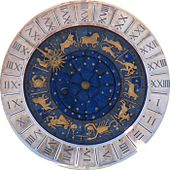
Back 택일 점성술 Korean Electiehoroscoop Dutch Astrologia eletiva Portuguese Элективная астрология Russian Elekcijska astrologija Slovenian Елективна астрологія Ukrainian 擇日占星術 Chinese
| Astrology |
|---|
 |
| Background |
| Traditions |
| Branches |
| Astrological signs |
| Symbols |
Electional astrology, also known as event astrology, is a branch found in most traditions of astrology according to which a practitioner decides the most appropriate time for an event based on the astrological auspiciousness of that time.[1] It differs from horary astrology because, while horary astrologers seek to find the answer to a question based on the time the question was asked, electional astrologers seek to find a period of time which will result in the most preferable outcome for an event being planned.
Historically used primarily to schedule battles, electional astrology has been used by its proponents to plan a number of events, including weddings and trips.[2][3]
Modern discoveries about the true nature of celestial objects has undermined theoretical bases for believing that their motions affect luck, and empirical scientific investigation has shown that predictions and recommendations based on these systems are not accurate.[4]: 85, [5]: 424 Astrology in general counts as a pseudoscience.[6]
- ^ Radu. "Electional Astrology - definition, examples, limits, reading". Astrology Weekly. Retrieved 2020-11-14.
- ^ Wiggers, Carol. "Electional Astrology using Classical/Traditional Methods". Traditional Horary Astrology. Retrieved 2020-11-14.
- ^ Holden, James H. (2006). History of Horoscopic Astrology. American Federation of Astrologers. p. 15. ISBN 0-86690-463-8.
- ^ Jeffrey Bennett; Megan Donohue; Nicholas Schneider; Mark Voit (2007). The cosmic perspective (4th ed.). San Francisco, CA: Pearson/Addison-Wesley. pp. 82–84. ISBN 978-0-8053-9283-8.
- ^ Zarka, Philippe (2011). "Astronomy and astrology". Proceedings of the International Astronomical Union. 5 (S260): 420–425. Bibcode:2011IAUS..260..420Z. doi:10.1017/S1743921311002602.
- ^
Goode, Erich (16 August 2013). "8: Paranormalism and Pseudoscience as Deviance". In Pigliucci, Massimo; Boudry, Maarten (eds.). Philosophy of Pseudoscience: Reconsidering the Demarcation Problem. Chicago: University of Chicago Press (published 2013). p. 152. ISBN 9780226051826. Retrieved 2019-01-15.
The National Science Board, under the auspices of the National Science Foundation (NSF), sponsored thirteen surveys between 1979 and 2008 that demonstrated an increase in the percentage of Americans who believe that astrology is at least 'not at all' scientific - from 50 to 63 percent. [...] Astrology represents one of the few pseudo-scientific belief systems that in recent years has manifested a decline among the general public. NSF concludes that, given its lack of an evidentiary basis and its invocation of powers unknown by scientists and outside the realm of the natural laws, astrology is a pseudoscience.